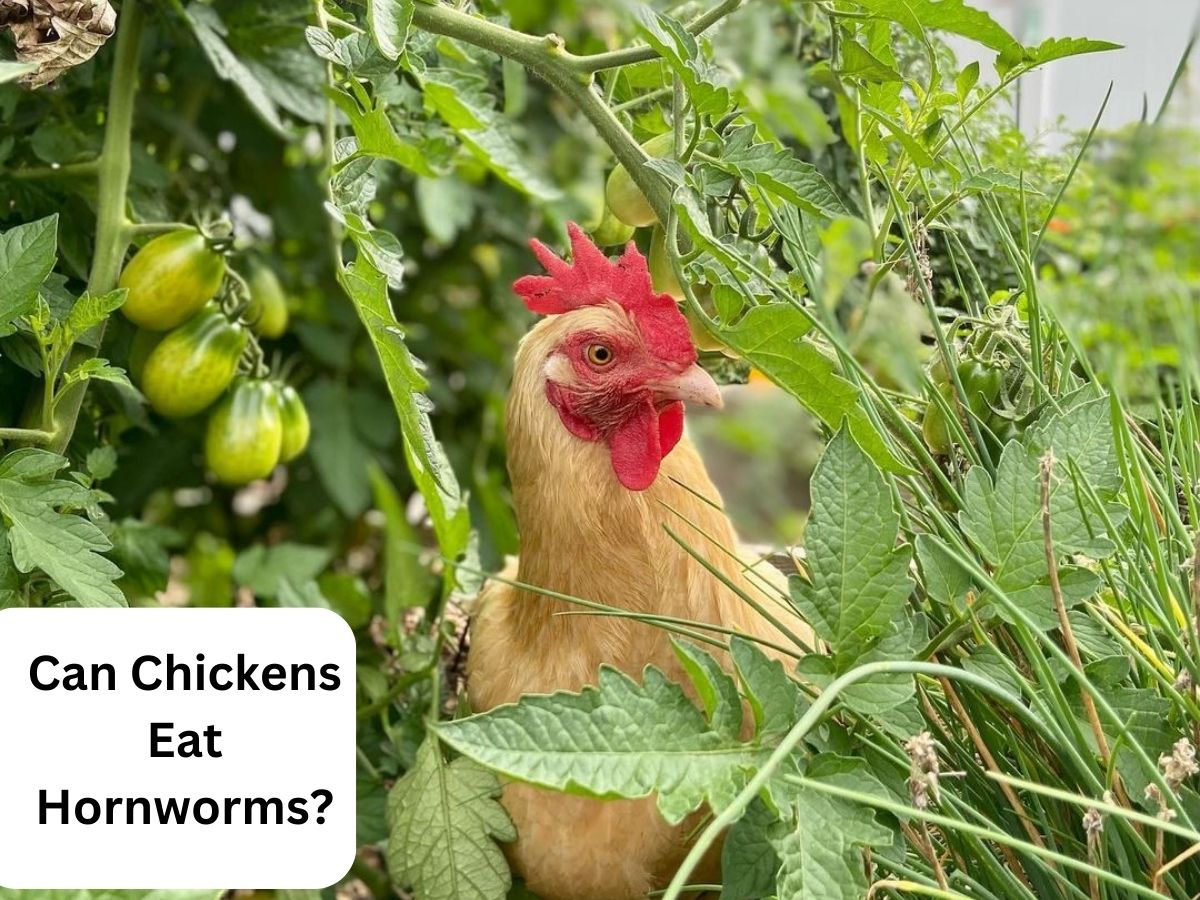Curious gardeners and poultry enthusiasts alike often find themselves pondering the question: Can chickens eat hornworms? Well, prepare to be amazed because these feathered foragers might just have a surprising taste for these garden pests; Imagine your flock of chickens strutting around the yard, not just as charming cluckers but as natural pest controllers. Hornworms, those plump leaf-munching caterpillars, might just become their new favorite snack.
Chickens, with their omnivorous appetites and inherent curiosity, are no strangers to exploring the world around them. But the idea of them chowing down on hornworms adds a whole new layer of intrigue to their dietary habits.
So, can they devour these notorious plant nibblers? The short answer: Yes; Chickens can indeed eat hornworms, and there are potential benefits tucked away in these wriggling insects.
Hornworms, often considered pests due to their voracious appetite for garden greens, hold an untapped nutritional value that might surprise you.
These caterpillars are like tiny protein powerhouses, offering essential nutrients that can contribute to the health of your feathered flock. Plus, watching chickens indulge in this natural behavior of hunting and pecking can be as entertaining as it is beneficial.
In this engaging exploration, we’ll dive deep into the world of backyard chickens and their unexpected culinary choices. We’ll uncover the reasons why chickens find hornworms so appealing and how their snacktime could be advantageous for both your chickens and your garden.
So, if you’re curious about introducing this unique delicacy to your feathered friends, keep reading to learn more about the dynamic relationship between chickens and hornworms. Your garden – and your chickens – might just thank you for it.
What Are Hornworms?
Hornworms, those plump and intriguing caterpillars, are the talk of the garden – and not always in a positive light. These chubby critters, often sporting a distinctive horn at their rear end, belong to the Sphinx moth family.
With their vibrant colors, ranging from vivid green to shades of brown, they’re hard to miss among the foliage. If you’re a gardener, you’ve likely come face-to-face with these voracious eaters.
Hornworms have a knack for appearing seemingly out of nowhere, feasting on tomatoes, tobacco, and other plants with gusto. You might find their undeniable munching ability frustrating, but keep in mind that their presence sparks an interesting question: Can chickens eat hornworms?
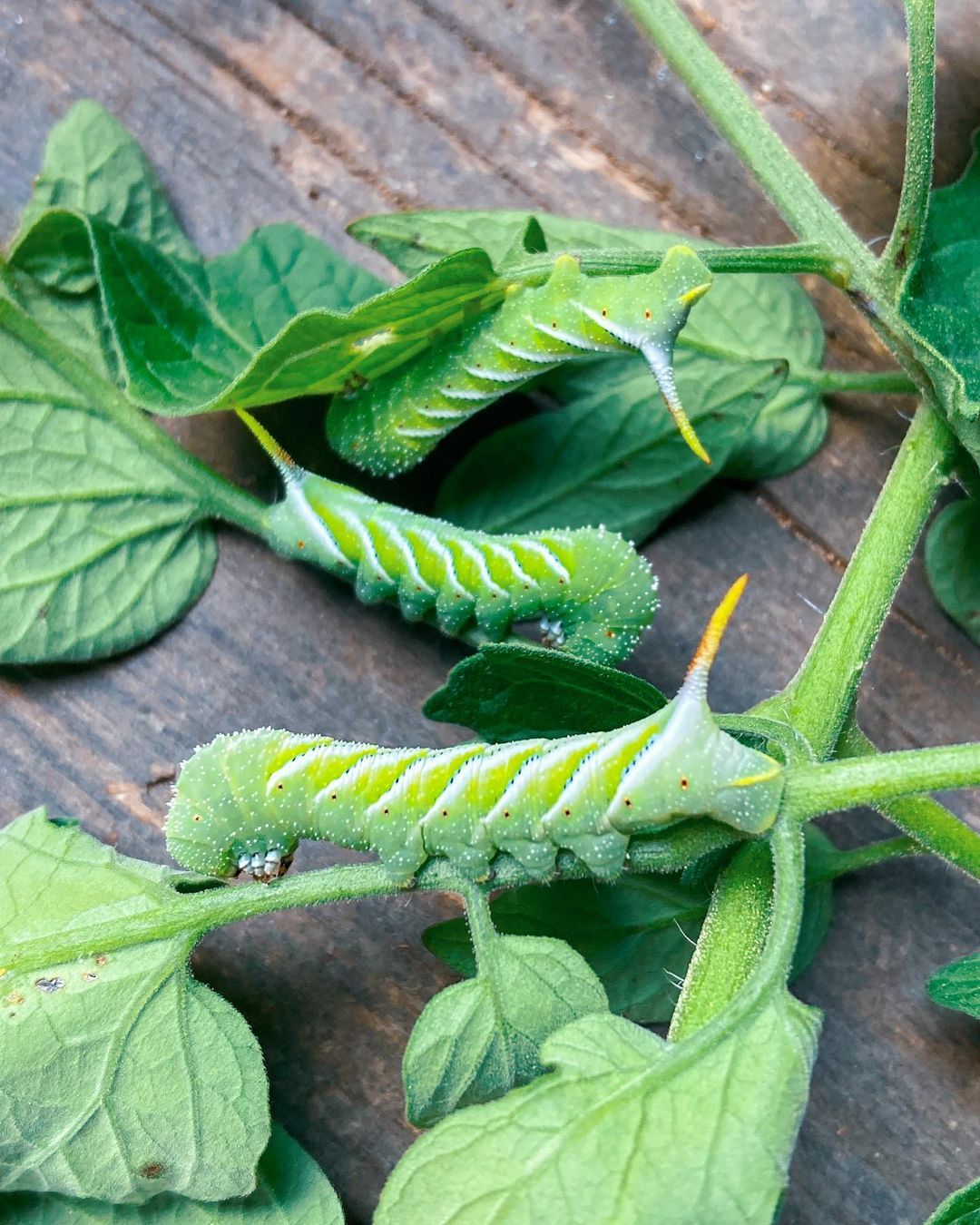
Nutritional Value of Hornworms
Hornworms might be garden pests, but they’re remarkably nutritious – and not just for plants. These plump caterpillars are like nature’s little nutrient packages.
Packed with protein, essential fats, vitamins, and minerals, they offer a substantial nutritional boost that can benefit your chickens in unexpected ways.
Protein, a vital component of any diet, is abundant in hornworms. This protein infusion can aid in feather growth, muscle development, and egg production, keeping your chickens in top-notch condition.
But it’s not just about the protein punch. Hornworms also contain valuable fats that provide a concentrated energy source for your feathered friends. These fats are essential for maintaining healthy skin, promoting organ function, and even assisting in the absorption of certain vitamins. Vitamins like B-complex and vitamin A are present in hornworms, contributing to overall vitality and immune system support.
So, if you’re wondering whether these seemingly troublesome creatures can actually be a culinary delight for your chickens, the answer lies not only in their taste but also in the nutritional benefits they bring. The next time you spot hornworms ambling through your garden, you might just see them in a whole new light – as potential feathered feasts that contribute to the well-being of your flock.
Chickens’ Diet in the Wild
When you think of chickens, you might picture them pecking at grains in a barnyard. But in the wild, their menu is much more diverse. Chickens are true omnivores, meaning they aren’t picky eaters; they’ll gladly devour a smorgasbord of options that nature offers.
Insects, worms, seeds, and even small vertebrates make up their natural diet. They’re masters of scratching and digging, uncovering hidden treasures beneath the soil and among the foliage.
With their omnivorous nature and adaptive feeding habits, chickens have evolved to take advantage of the resources available in their environment. This adaptability ensures that they’re well-equipped to thrive in various ecosystems, from forests to grasslands.
Benefits of Insects in Chicken Diet
In the world of poultry, insects are like little nutritional powerhouses, and chickens know it all too well. Incorporating insects into their diet brings a medley of benefits that contribute to their overall health. One major advantage is the high-quality protein insects provide.
Chickens require protein for a host of bodily functions, from building strong muscles to producing eggs with sturdy shells. Insects, including those pesky hornworms, offer a convenient and tasty way for chickens to meet their protein needs.
But it’s not just about the numbers on the nutrition label. Insects play into chickens’ natural foraging behavior, keeping them engaged and active. Picture a chicken clucking contentedly as it hunts for insects, mimicking the same behavior it would exhibit in the wild. This not only keeps them mentally stimulated but also encourages physical activity – a key component of their overall well-being.
As you consider introducing hornworms to your chickens’ diet, remember that you’re tapping into an age-old dietary preference. Chickens’ instinctual love for insects harkens back to their ancestral roots, where they relied on these critters for sustenance. By offering insects, including hornworms, as part of their diet, you’re not just feeding them; you’re connecting them with their natural instincts and promoting their optimal health.
Can Chickens Eat Hornworms?
Now, let’s address the big question on everyone’s minds: can chickens really enjoy a meal of hornworms? The answer is a resounding yes; Chickens can indeed indulge in these plump caterpillars without any major concerns.
In fact, hornworms can be a nutritious addition to their diet, offering a boost of valuable nutrients. However, as with any dietary addition, moderation is key. While hornworms bring benefits, they shouldn’t become the main course on the menu.
The need for moderation and variety in their diet is important to remember that chickens thrive on a diverse and balanced diet. Just like humans, they need a mix of nutrients from various sources to ensure their well-being.
So, while you treat your feathered companions to an occasional hornworm feast, make sure it’s part of a well-rounded diet that includes grains, vegetables, and other protein sources.
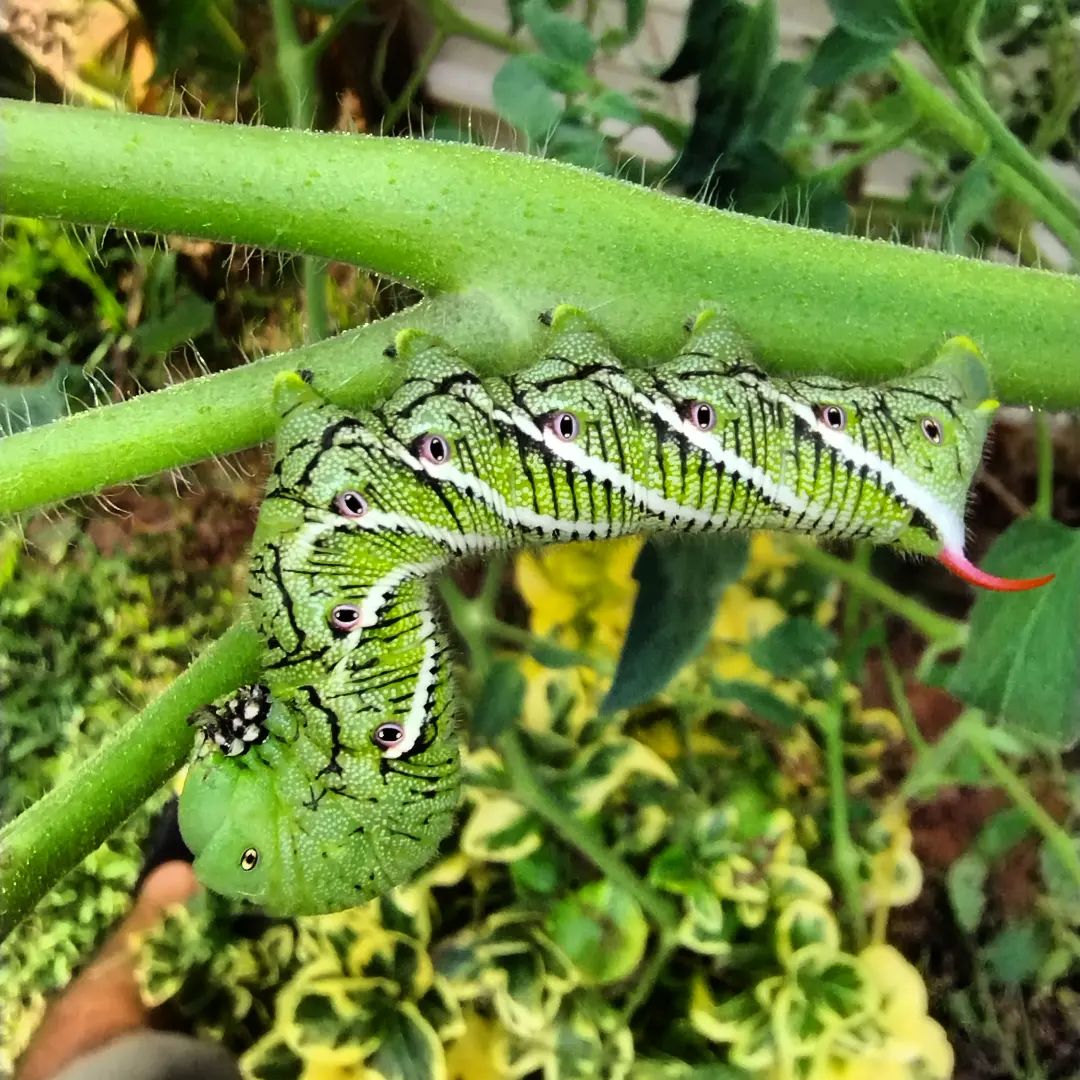
Potential Benefits for Chickens
So, what’s in it for the chickens when it comes to indulging in hornworms? Quite a bit; First and foremost, these wriggly critters are packed with protein, which is a fundamental building block of life.
Adding hornworms to their diet can help chickens meet their protein needs, especially during periods of egg-laying or growth. The result? Stronger eggshells, healthier feathers, and overall improved vitality.
But there’s another hidden advantage: pest control. Hornworms are notorious leaf-chompers, and having your chickens feast on them can be a natural way to keep their population in check.
It’s a win-win situation – your garden gets protection, and your chickens get a tasty treat that taps into their innate foraging behavior.
So, as you contemplate introducing hornworms into your chickens’ culinary repertoire, remember that you’re not only broadening their palate but also enriching their diet with a range of benefits. Just like any gourmet meal, moderation and variety are the keys to a happy and healthy flock.
Precautions and Considerations
Before you serve up a platter of hornworms to your eager chickens, a few precautions are in order. Properly sourcing and preparing these crawly morsels is essential to ensure your feathered friends receive all the benefits without any unwanted surprises.
If you’re handpicking hornworms from your garden, don’t forget those gloves – it’s a bit like a culinary treasure hunt. Alternatively, you can find hornworms from reliable suppliers known for their pesticide-free approach.
Mentioning the importance of ensuring the hornworms are free from pesticides, remember that these caterpillars can sometimes come into contact with chemicals used in gardens.
Any pesticide residues can potentially harm your chickens. A simple rinse in clean water can help remove any unwanted residues before offering them to your flock.
Moderation and Balance
While your chickens might revel in the novelty of hornworms, remember that balance is the name of the game. Treats, no matter how enticing, should never replace the staple components of a chicken’s diet. Emphasizing the need to offer hornworms as a treat rather than a primary food source, think of these crawling critters as dessert – delicious and delightful, but not the main course.
A balanced diet is crucial for your chickens’ overall health and well-being. Just like humans, they require a mix of nutrients to stay in tip-top condition. Grains, vegetables, and other protein sources are all part of the equation.
By providing a varied menu, you’re ensuring your chickens receive the full spectrum of nutrients they need to lay those eggs, strut their stuff, and scratch up the yard.
In the grand symphony of poultry care, offering hornworms is a melodious note that adds both flavor and variety to your chickens’ dietary repertoire.
As you step into this exciting adventure of expanding their menu, keep these precautions and considerations in mind. With the right balance and mindful preparation, your chickens will reap the rewards of their hornworm escapades while continuing to enjoy the overall goodness of a well-rounded diet.
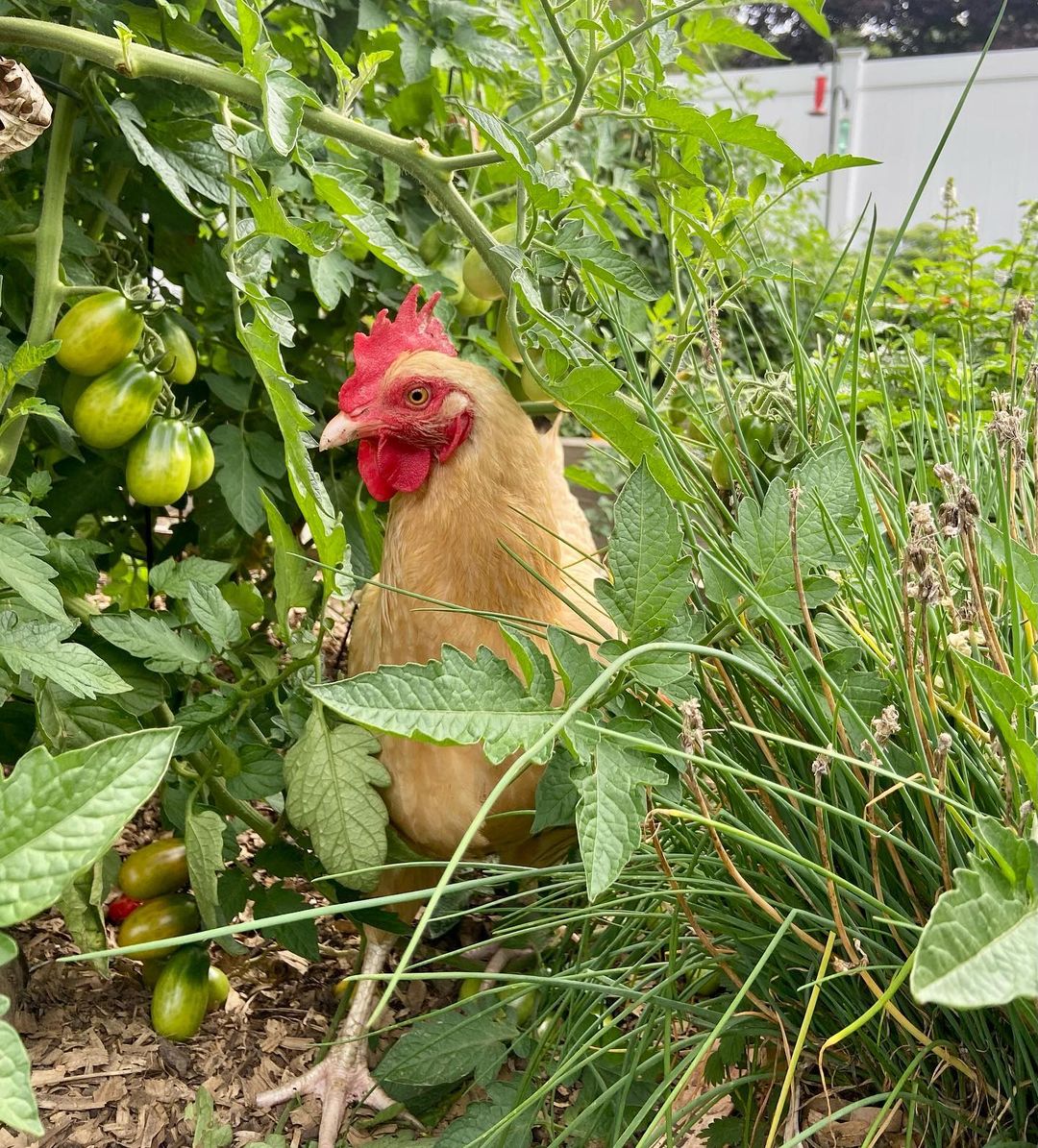
Can All Chicken Breeds Eat Hornworms?
Absolutely, the culinary delight of hornworms isn’t limited to specific chicken breeds. All chicken breeds can partake in the hornworm feast, provided they’re mature enough to handle solid treats. From the robust Rhode Island Reds to the elegant Leghorns, and every breed in between, hornworms can be a delightful addition to their diet.
However, while hornworms are generally safe for all breeds, it’s important to keep individual chicken sensitivities in mind. Some chickens might have more delicate digestive systems, so it’s a good idea to introduce any new treats gradually. Just like humans trying a new food, chickens might need a little time to adjust.
Remember that moderation is key, regardless of breed. While hornworms offer a trove of benefits, they should be incorporated into your chickens’ diet as a treat, not a main course.
Balancing their diet with a mix of grains, vegetables, and other protein sources ensures their nutritional needs are fully met.
So, whether you have feathery friends known for their egg-laying prowess or those prized for their fancy plumage, consider treating them all to the scrumptious goodness of hornworms.
The delight in their eyes as they peck and nibble will undoubtedly confirm that these wriggly treats are a universal hit among chicken breeds.
Are There Any Signs of Allergies or Adverse Reactions to Watch For?
While chickens generally enjoy a diverse diet without much fuss, it’s wise to keep an eye out for any potential signs of allergies or adverse reactions when introducing new treats like hornworms. Chickens are not typically prone to allergies like humans, but there are a few indicators you can watch for to ensure their well-being.
- Digestive Upsets: If you notice any sudden changes in your chickens’ droppings, such as diarrhea or unusually foul-smelling stool, it might signal digestive distress. While it’s not a surefire sign of an adverse reaction, it’s worth monitoring.
- Lethargy or Loss of Appetite: If your chickens suddenly seem less active or show a lack of interest in their usual food, it could indicate that something isn’t agreeing with them.
- Behavioral Changes: Watch for any unusual behaviors, such as excessive scratching, feather-pulling, or restlessness. These could be signs of discomfort.
- Skin Irritations: While rare, some chickens might develop skin irritations in response to new foods. Keep an eye out for any signs of itching, redness, or inflammation.
It’s important to note that any of these signs could be caused by factors other than the introduction of hornworms. If you suspect an adverse reaction, it’s a good idea to temporarily remove the treat from their diet and monitor their behavior and health. If symptoms persist or worsen, consulting a veterinarian with experience in poultry care is recommended.
Remember, chickens’ well-being is a priority, and a little vigilance goes a long way. While the odds of adverse reactions to hornworms are low, being an attentive chicken parent ensures that your feathered companions continue to thrive and enjoy their diverse menu without any hiccups.
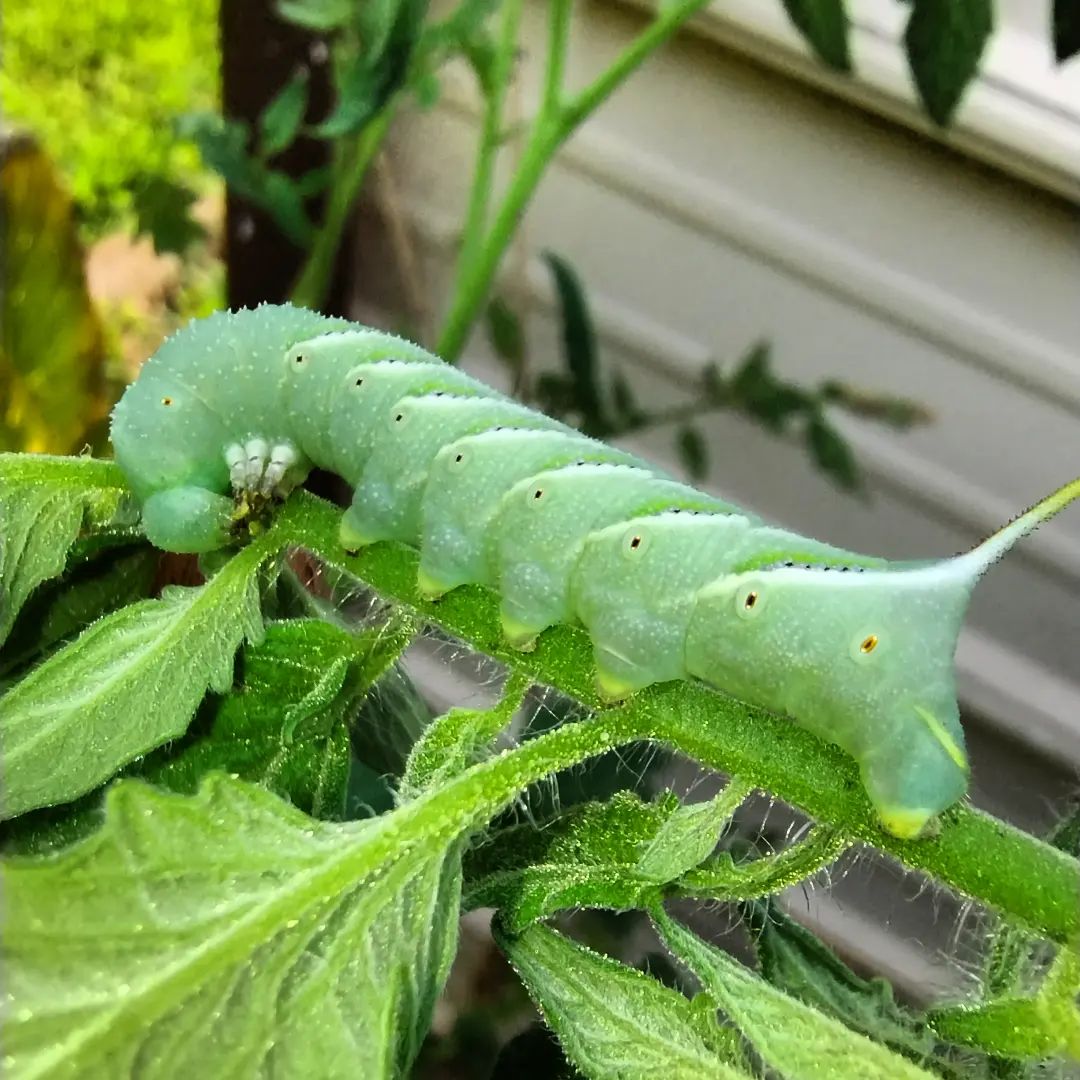
Can Chickens Eat Hornworms FAQs?
Can All Chicken Breeds Eat Hornworms?
Absolutely, the culinary delight of hornworms isn’t limited to specific chicken breeds. All chicken breeds can partake in the hornworm feast, provided they’re mature enough to handle solid treats.
Chickens are natural foragers, and their omnivorous diet means they can enjoy a variety of foods, including insects like hornworms. Whether you have large heritage breeds or smaller bantams, hornworms can be a delightful addition to their diet.
However, while hornworms are generally safe for all breeds, it’s important to consider the size of the chicken in relation to the size of the treat. Young chicks may find larger hornworms difficult to manage, so it’s a good idea to wait until they’re a bit older before offering this treat.
Remember, individual chicken sensitivities can vary, so always keep a watchful eye after introducing any new food to your flock. And as always, moderation is key.
While hornworms offer a range of benefits, they should be incorporated into your chickens’ diet as a treat, not a main course. Ensuring a balanced diet that includes grains, vegetables, and other protein sources will keep all breeds of chickens in top-notch condition.
How Often Can I Feed Hornworms to My Chickens?
When it comes to treating your feathered friends to hornworms, the rule of thumb is moderation. Offer hornworms to your chickens once or twice a week, depending on their flock size and individual dietary needs. This frequency strikes a balance between providing the nutritional benefits of the treatment and ensuring that their main diet remains well-rounded.
Remember, while hornworms are a tasty and nutritious treat, they shouldn’t replace the staple components of a chicken’s diet. Chickens require a mix of nutrients for optimal health, and variety is key.
Grains, vegetables, and other protein sources should continue to form the core of their diet. By incorporating hornworms as a periodic delicacy, you’re enhancing their menu without unbalancing their nutritional intake.
Observing your chickens’ reactions and health after introducing hornworms can guide you in determining the ideal frequency for your specific flock. It’s all about finding that perfect harmony between treating your chickens and maintaining their overall well-being.
Are There Any Chickens That Shouldn’t Eat Hornworms?
While hornworms can be a delightful addition to most chickens’ diets, there are a few exceptions to keep in mind. Chicks and very young birds should not be fed hornworms, at least not until they are a bit older and have been introduced to a more standard diet.
Young chicks have different nutritional needs during their rapid growth phase, and introducing new treats like hornworms too early can upset the balance of their diet.
Additionally, if you have chickens with specific dietary restrictions or health conditions, it’s a good idea to consult a veterinarian or poultry nutritionist before introducing hornworms. Certain health issues might necessitate a specialized diet that doesn’t include treats like hornworms.
Can Hornworms Replace Commercial Chicken Feed Entirely?
While hornworms are indeed nutritious and can provide valuable protein and nutrients, they should not replace commercial chicken feed entirely. Hornworms can be a wonderful treat and supplement to a chicken’s diet, but they lack the complete nutritional profile that a well-balanced feed provides. Commercial chicken feed is formulated to meet the specific dietary needs of chickens, providing them with essential vitamins, minerals, and a well-rounded mix of nutrients.
Hornworms, despite their nutritional value, should be considered just that – treats. Chickens require a diverse diet to stay healthy, and commercial feed serves as the foundation of their nutrition.
Feeding hornworms exclusively would likely result in dietary imbalances and deficiencies, affecting their overall health, egg production, and growth.
Incorporating hornworms into their diet is a fantastic way to offer enrichment, protein supplementation, and the joy of foraging.
However, maintaining a balanced diet that includes commercial feed ensures that your chickens receive all the nutrients they need to thrive. So, while your chickens might relish their hornworm indulgence, remember that it’s just one flavorful part of their culinary journey.
Conclusion
As we conclude this journey into the intriguing world of chickens and hornworms, one thing is abundantly clear: these feathered friends have a surprising appetite for the garden’s crawling inhabitants.
From their instincts as foragers to their remarkable ability to derive benefits from seemingly pesky pests, chickens have shown us once again that they’re the ultimate garden companions.
Hornworms, those leaf-munching caterpillars that often raise gardeners’ eyebrows, are not just a snack for chickens; they’re a source of nutrition and entertainment.
We’ve uncovered the nutritional value that these plump insects bring to the table, with their protein-packed bodies and beneficial fats. While moderation is key and balance is paramount, offering hornworms as an occasional treat can contribute to the overall health and well-being of your flock.
Remember, the delight in your chickens’ eyes as they chase down these crawling delicacies is a testament to the natural harmony that exists between the garden and the coop. It’s a symbiotic relationship where chickens fulfill their foraging instincts while assisting gardeners in pest control.
As you venture forth with hornworms in hand and a keen eye on your chickens’ reactions, you’re embarking on a journey that bridges the worlds of nature and nurturance.
Your chickens will cluck their gratitude as they peck and nibble their way through this newfound delight, adding a flavorful chapter to their culinary escapades. So go ahead, let your chickens indulge in the world of hornworms – and relish in the joy of providing both a treat and a taste of the wild to your beloved flock.
